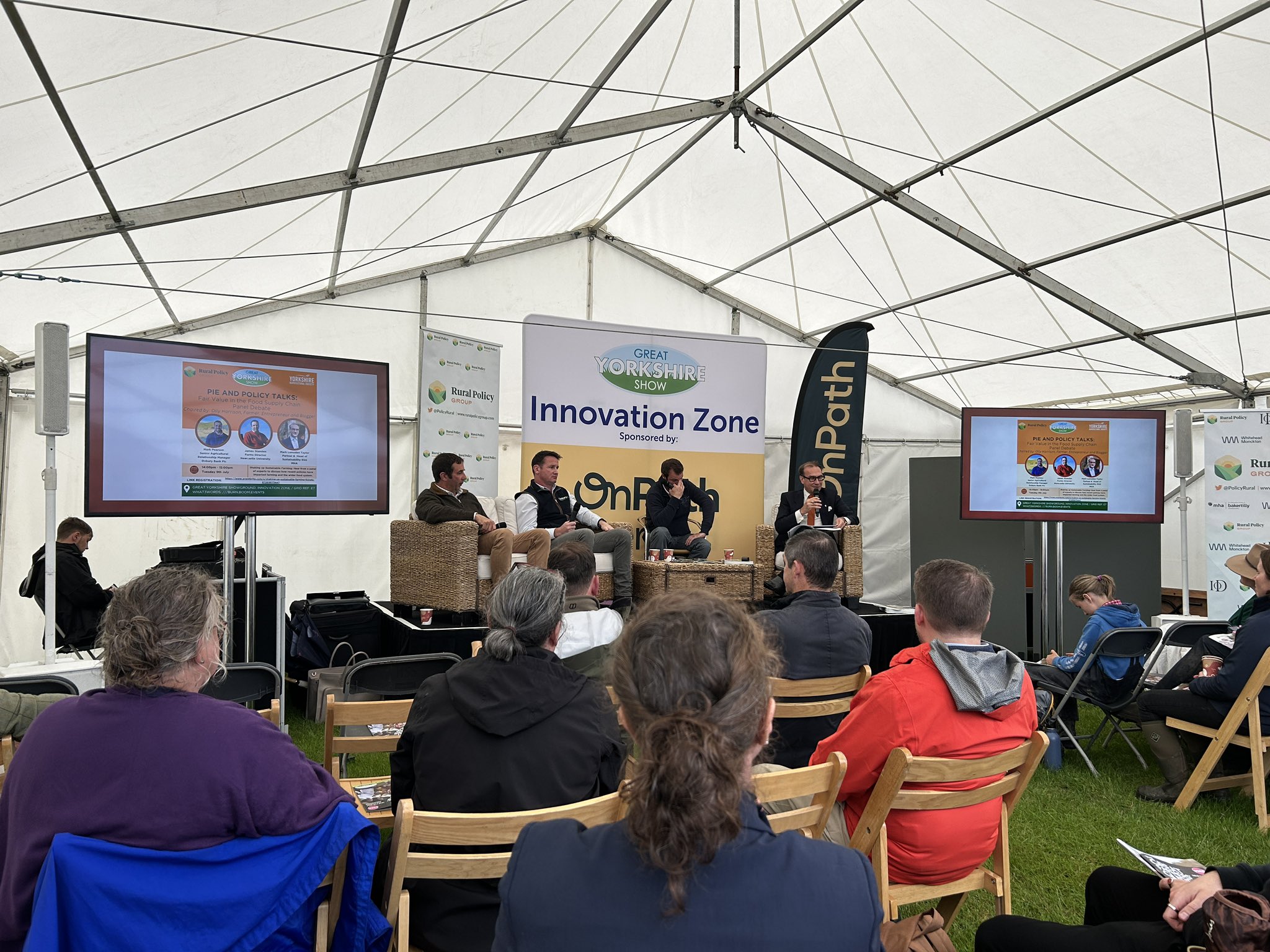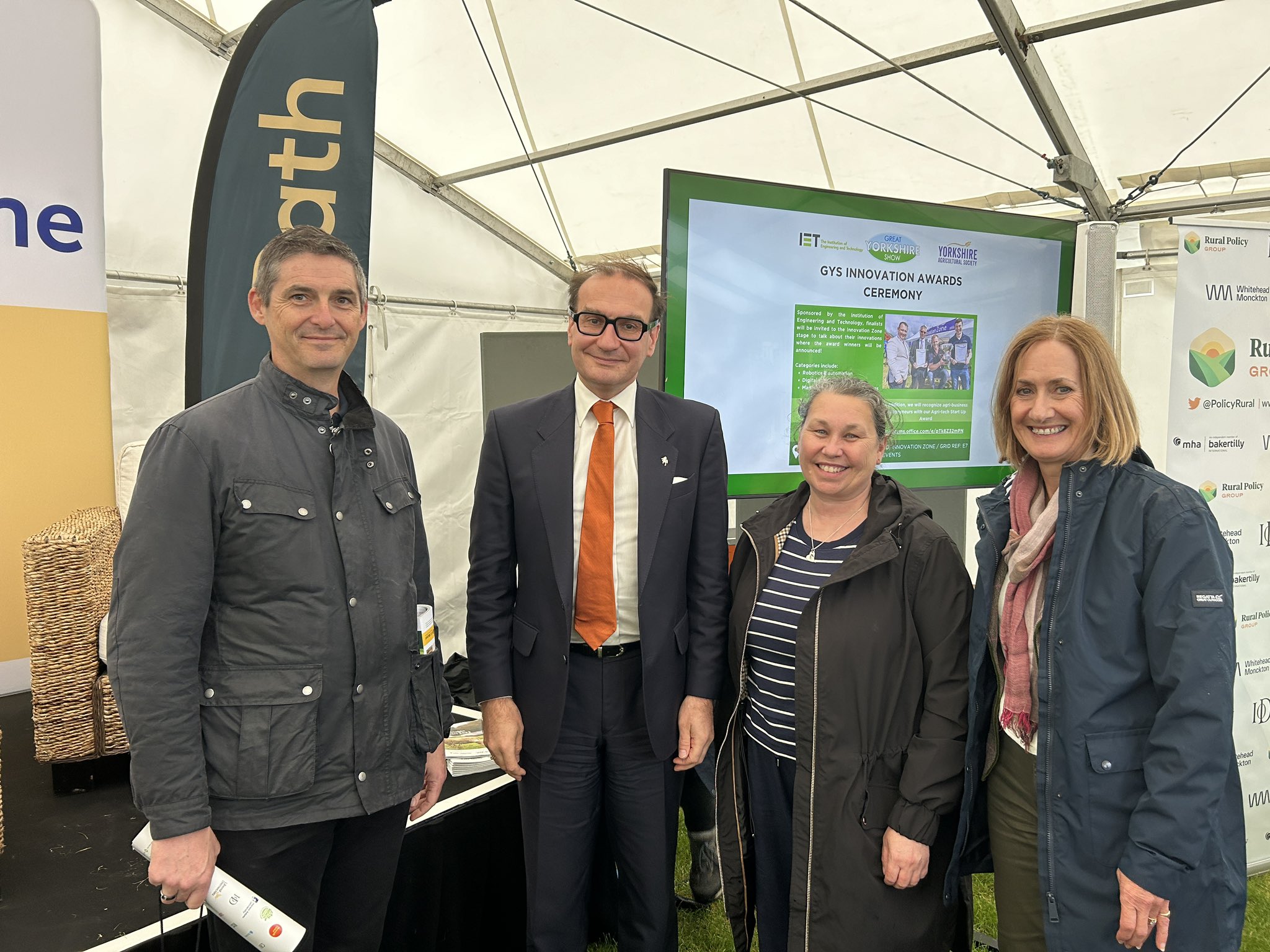RPG visits the Great Yorkshire Show
Rural Policy Group (RPG) went on tour this summer to ask Britain’s farmers what they need from the new government.
The food and farming policy group visited four of the country’s most loved agricultural shows to discuss why food production in the UK is in decline and what the new team at Defra can do to boost productivity in our food supply base.
The tour took in some of Britain’s most prominent agricultural regions, starting at the South of England Show before progressing to Lincolnshire, Kent and finally the Great Yorkshire Show on 9th July.
At the event, which was hosted by the Yorkshire Agricultural Society, we spoke to farmers and food industry professionals to understand what the sector needs from the new Labour cabinet to unleash its economic potential.

Yorkshire’s asks of the new government 1. stabilise the economy
Olly Harrison, Farmer, Entrepreneur and You Tube Blogger: “Every farmer I know has been challenged by the double whammy of high inflation and high interest rates. The cost of inputs has risen faster than the sale prices we can realise and mortgage repayments have shot up. The most important thing the government could do to benefit the whole sector is to stabilise the economy”.
Agricultural incomes are not good and farm profitability is perilously low, averaging just 0.5% return on capital employed. Continuing to bring down the rate of inflation and creating an environment in which the Bank of England can feel confident lowering the base rate are fundamental to improving the UK’s self-sufficiency. In recent years, economic instability has nudged farming businesses towards lowering output in response to declining profits and increased financial risk. Normalising input costs and lowering mortgage and loan repayments will restore a degree of profitability to farms and reinvigorate investment.
British farming is an important pillar of a healthy economy; it delivers affordable and nutritious foods as well as being a major employer in rural communities and a contributing to the UK’s ambitions for a green economy. However, historically public funding for capital projects, such as Calf Housing for Health and Welfare and the Slurry Infrastructure Grant (SIG), has been too small to make a big impact. Unlocking private sector investment will be crucial to bringing ever greater efficiencies and productivity to farming, and it is these efficiencies which will make British food competitive at home and in export markets.
Ask 2. Establish a baseline set of environmental metrics for agriculture
Mark Lumsdon Taylor, Partner at MHA and Chairman of Rural Policy Group: “The new Defra team need to consider how regulation around scope three emissions and other environmental policies will affect the agri-food supply chain. The introduction of contractual obligations around emissions will mean new behaviours and a heavier burden of audit compliance for farm businesses. We need governmental support to establish a baseline set of metrics for farms to work towards”.
Lumsdon-Taylor went on to say: “This support would need to include spearheading the national effort to develop new technologies so farmers can harvest the data they need to report accurately on environmental results. Funding, nationally co-ordinated R&D programmes and an emphasis on applied research are needed to make ideas a reality. Commercialising environmental outputs requires the ability to monitor, measure and manage those outputs to make certain farmers receive a fair reward”.
Agricultural businesses are embracing the transition to a more sustainable economy. Their core food production business is increasingly being entwined with and complimented by environmental work to improve soil quality, plant trees, increase biodiversity, offset carbon and a multitude of other goals which will improve the health of the planet. This work needs to be respected and fairly rewarded from the outset.
However, to reward farmers for their environmental outputs, we need to understand what those outputs are and how to measure them. One example, how do we measure an increase or decrease in soil carbon? There is a financial imperative to answering these questions as the carbon capture, utilisation and storage (CCUS) market matures. Arable farming is on its knees and a good crop of wheat can sequester more carbon than trees. Being able to generate a second income from a crop of wheat would encourage farmers to plant a greater area.
Establishing a common set of environmental metrics isn’t just about new income streams, it’s about protecting the established ones. Not having environmental policies and metrics in place is a risk for big businesses and that risk will be calculated into the pricing for suppliers.
Similarly, banks are able to lend at preferential rates for businesses with measurable environmental social governance (ESG) policies as a ‘green’ loan book helps them to comply with their own environmental performance and reporting requirements.

Ask 3. take a leadership role in planning for farms
Matt Ryan, Head of Farmer Relationships at Oxbury Bank plc: “I would like to see leadership from the government on planning regulation reform to release the investment in finance which will allow Britain’s farmers to increase production and reduce our reliance on imports. Not only will this support the viability of farm businesses, but higher output will also contribute to more competitive pricing for consumers”.
The design and implementation of planning regulations and planning authorities has scope to deepen its understanding of animal welfare regulations and how farms operate. For example, supermarkets are asking for more space for broilers to improve animal welfare. Another 500 sheds would need to be put up nationally to produce a similar amount of chicken under the new standards. Complicated and lengthy planning applications are holding up our ability to meet higher standards of animal welfare. An investment in a shed in Shropshire has been held up in appeals for five and a half years so far.
Environmental regulations should not be ignored, but continuous appeals are putting the brakes on growth and in the meantime, we are importing chicken from countries with lower welfare and environmental standards than our own.
To meet the new welfare standards, sheds will need to be destocked by circa 30%. This drop in productivity makes poultry businesses unviable without additional buildings to maintain flock size and yet the applications are being treated as if they are for flock expansion. More nuance is needed to enable community positive applications to pass quickly.
Ask 4. make policy in collaboration with other departments
James Standen, Farms Director for Newcastle University: “The linkages between healthy food and a lower burden on the NHS are under-recognised. From a systemic perspective, an investment in agricultural productivity is an investment in health and economic growth. These investments will return savings in other areas and boost workforce health and productivity across the wider economy”.
Obesity costs the NHS £6.5 billion per year and is the second biggest preventable cause of cancer, according to a Department for Health and Social Care blog from 2023. Traditionally, government departments and budgets are not set up to measure return on investment interdepartmentally. More collaboration between departments is needed to highlight the trickle out benefits of investing in agriculture: a healthier population, training, employment and wealth creation in isolated locations, levelling up rural areas, contributing to environmental recovery and net zero.
Similarly, the labour shortages in agriculture and food processing cannot be solved by Defra alone, they require collaboration with the Department for Education (training), the Department for Work and Pensions (labour availability), the Home Office (migration) and the Department for Science, Innovation and Technology (automation) amongst others to provide a holistic response to the problem at hand.

Ask 5. attract new talent to agriculture
Persistent labour shortages have contributed to the contraction of food production since 2019 when the pandemic and the UK’s departure from the EU meant fewer seasoned professionals from overseas were able to take up employment on British farms. The 2020 Pick for Britain campaign demonstrated how reticent British people were to undertake seasonal farm work when it failed to fill the vacancies created by travel restrictions and border controls. It was scrapped in 2021 after recruiting only 5-11% of the 70,000 seasonal workers required.
The Seasonal Agricultural Workers Scheme (SAWS) was welcomed by farmers and has gone some way to address the shortages, although it is often criticised as being expensive and difficult to access. Alongside SAWS, we need government, industry and academia to look at how the industry can recruit British people into agribusiness.
Traditionally, agriculture had a limited pool of white male applicants. However, land-based colleges are recruiting a more balanced gender mix onto their courses. These women and girls are challenging the status quo and contributing to a larger pool of knowledge and skill in food production. More still needs to be done to explore the factors which are preventing more ethnically diverse entrants to the sector.
One of the biggest challenges to recruitment is salaries. There is not the money in most farm businesses to pay high salaries and young people can earn more in almost any other industry. To resolve this, we need to pull levers which would stimulate productivity and profitability: fair value in the food supply chain, long-term policy decisions to bring stability back to the sector, planning committees which are business positive, economic stability to allow pricing to normalise, fairly rewarding new ventures into green markets.

Hear what the Yorkshire and the North West farming community had to say in their own words…
Olly Harrison, Farmer, Entrepreneur and @OllyBlogs Vlogger; Matt Ryan, Head of Farmer Relationships at Oxbury Bank plc and James Standen, Farms Director at Newcastle University.

